
Transcription
California's Dirty Little Secret
This article exposes the fact that 30 years ago, political pressure from victims' rights groups and police organizations convinced those at the top of California judicial and executive branches to violate their oaths, and illegally create a capital appellate process. The California Supreme Court was granted control over all aspects of capital appeals. By controlling the funding and appointments of defense counsel, they pierced the attorney/client relationship to ensure that no condemned prisoner would ever prevail on appeal.
For the past 36 years, they have used these policies to maintain a 100% affirmation rate of all capital appeals.
[redacted]
One of the most frequently asked question is why has it taken 30 years to process your appeal through state court? The answer is the question is simple: fraud. The details of how this fraud is executed, complicated.
In order to fully understand how the appeal process has been altered, it is necessary to understand how it is supposed to operate. Under normal circumstances, once you are convicted, an attorney and his client will determine what type of appeal to file and to what court. The types of appeal are direct appeal, which challenges the evidence presented at trial. Or any other irregularities are occurred during the course of the trial. Or a writ of habeas corpus. This type of appeal challenges the conviction based upon newly discovered evidence or constitutional violations. Such as a prosecutor who withheld evidence. Or a judge that made a decision contrary to established law. These appeals must be filled within one year of the sentencing. Ordinarily, the appeal would be filed to the district court. This is a federal court that monitors the outcomes of state criminal trials to ensure that the accused constitutional rights were respected. This is the way death penalty appeals were processed prior to June 6, 1989.
The district courts and the California Supreme Court were reversing 79% of all capital cases they reviewed. In 1986, Republican politicians convicted victims' rights groups that if elected they would rid the state of the liberal supreme court and jump start the death penalty. Governor George Deukmejian and his Republican colleague, Dan Lungren, were elected. As the newly elected Attorney General, it was Dan Lungren's responsibility to argue on behalf of the state in favor of executions.
Within three years of their election, Deukmejian and Lungren were able to unseat justices, Rose Bird, Cruz Renoso, and Joseph Grodin from the California Supreme Court. The governor quickly replaced the justices with his own appointments. Justices Eagleson, Kaufman, and Aguellas. They quickly reversed the trend of the former court. The new court affirmed 79% of all capital cases they reviewed. However, capital cases were still being sent to the federal district court. Something had to be done to stop these cases from being overturned in the first place.
On June 6, 1989, the California Supreme Court justices created Policy 3. Under the United States Constitution any new laws must be approved by the legislature. The justices knew they had tremendous leeway under the newly elected Attorney General, who would not challenge their new laws. So they violated separation of powers and enacted Policy 3. This policy gave the California Supreme Court complete control over all aspects of capital cases. Cases would no longer be sent to the federal district courts for review, thus effectively blocking federal court review of the state court trials. All capital cases would be sent directly to the California Supreme Court.
The new policy also gave the court complete control over the type of appeal that would be filled. The attorney and his client would only be allowed to file a direct appeal. The writ of habeas corpus would be deferred until after the direct appeal was adjudicated. This was a violation of the constitutional prohibition against the suspension of the writ of habeas corpus.
These new laws could not have been enacted without the cooperation of the governor and the Attorney General. As members of the executive branch, it was their responsibility to challenge all laws that did not comply with the state and federal constitutions. But, more importantly, these new laws could not have been enacted without the cooperation of the appellate defense attorneys. Ordinarily, attorneys would be randomly selected from a pool of qualified lawyers. If a defense attorney raised a challenge to the new rules, the attorney general, the federal courts, and well as the United States attorney general would quickly quash the new laws as unconstitutional.
The California Supreme Court justices had a plan to combat this possibility as well. Shortly after the enactment of Policy 3, they created the California Appellate Project (CAP) from this point forward. All lawyers who represented condemned inmates would have to sign a contractual agreement with CAP to defer their legal training and comply with the newly created policies. The new policies gave specific directions on what issues to be raised. Any investigations and filings required prior approval of the court. In exchange, the attorneys would be rewarded with generous salaries.
The Republicans who conspired to create this illegal appellate process believed that they were going to use this denial of rights to expedite executions. What they failed to realize was by altering the Constitution they damaged the effectiveness of it. In other states, executions were occurring within eight years of sentencing. If the new judges were to adhere would be expedited into federal court. The federal court would likely reverse their decisions, as they do 73% of the time now. By altering the constitution and suspending the writ of habeas corpus, the process was significantly delayed.
These delays created an unintended benefit: cash. A death penalty case would ordinarily cost a state two million dollars to process from trial to execution. This was accomplished within eight years. As a result of Policy 3, many attorneys who were once willing to tackle capital cases were no longer willing to represent the condemned. Suddenly, there was a shortage of qualified attorneys. A condemned prisoner now waits for as long as seven years on death row awaiting the appointment of counsel. Once counsel is appointed, he or she is ordered to file only the direct appeal. No investigation into the constitutional violations or other legal strategies are permitted by the court. The average delay in the investigation and filing of the writ of habeas corpus is 17.3 years. Much of the documents, witnesses, and forensic evidence that was available shortly after trial are now lost. As a result, 13 people have been executed at a cost of nearly two billion dollars.
According to the leading authority on capital punishment in California, Justice Arthur L. Alarcon, nearly two trillion dollars has been spent on capital punishment over the past twenty-four years. Four billion is "unaccounted for." A completely copy of Justice Alarcon's report can be found at: Executing the Will of the Voters?: A Roadmap To Mend the California's Legislature's Multi-Billion Dollar Debacle (https://deathpenaltyinfo.org/documents/LoyolaCalifCosts.pdf).
There are 145 habeas corpus capital attorneys in California. There are 730 condemned prisoners. Each of these attorneys are paid $2.20 per hour, five days per week, for 27.6 years. A direct appeal brief and the reply are all filed within the first seven years; and there is no other work to be done. What attorney wouldn't appreciate that? Honest ones who would not sell out their clients...
This illegal appellate process could not exist if the condemned inmates were allowed to represent themselves. It has always been a cornerstone of American jurisprudence that any individual has a constitutionally guaranteed right to represent himself if he should chose to do so. The California Supreme Court justices took the extraordinary and unprecedented step of prohibiting all condemned inmates from self-representation.
The stage was now set for one of the most prolific embezzlement schemes in American history to prosper for twenty-four years and counting. The question on everyone's mind is how could this type of fraud exist for so long?
First and foremost, the California Bar Association has strict rules against attorney encroaching upon other attorney's clients. No decent, honest attorney would put his license on the line to represent a murderer. Everyone else involved has greatly benefited from the fraud. With the exception of the victims who were promised executions, and those few innocent individuals on death row who have had to wait 30 years to have their cases adjudicated in the federal courts. 73% of all cases that eventually reach the federal courts are reversed. This demonstrates and confirms the California Supreme Court's violation of federal law.
The attorneys who participate in this fraud and the California Supreme Court justices are involved in a fraudulent paper mill. The court has approved ten claims that can be filed on behalf of death row inmates. All direct appeal briefs contain the exact same claims, same issues, and the same case citings. All denials quote the same state laws. 98% of all direct appeals are denied. The average time to process such an appeal is 27.6 years at a cost of 20 plus million per case. The courts collect these huge sum of money from the state and federal governments and distribute it to CAP, who distributes it to its lawyers and support staff.
The state attorney general's office hires additional staff (more lawyers) who argue in favor of the ten claims approved by the court. Same claims, same issues, same case citings. The attorney general boasts that his trial prosecutor's around the state have the highest conviction rates in the nation. This is because the trial judges and prosecutors routinely violate defendant's rights during rial in order to obtain a conviction. They know that their decisions will not be reviewed by the California Supreme Court for 27.6 years. Long after they have retired from the practice of law.
The federal district courts benefit in two ways. First, they aren't seen as the bad guys reversing dozens of death penalty cases. The cases trickle over decades and are divided up into 29.
Secondly, they collect huge amounts of federal tax dollars to support federally funded capital lawyers. When a case reaches the federal court, new federal attorneys are appointed. Because the state court process is ineffectual, the federally funded investigation will inevitably discover new evidence and deficiencies with state counsel's performance. The federal judges then rule that the case must be returned to state court to give that jurisdiction an opportunity to correct the problems. Meanwhile, the federal court and the federal lawyers continue to collect federal dollars on a case they are not actually working on. Four billion unaccounted for. This return to state court to give them an opportunity to correct the problems usually requires an additional fifteen years. Which means the state and the federal government is collecting money from each case at the same time. There is no oversight.
Condemned inmates also benefit from this illegal appellate process. The inmate must wait seven years for the appointment of counsel. 13.9 years for his direct appeal to be filed. 17.3 years for his writ of habeas corpus to be filed. 27.6 years to get a decision from the state court.
Every day that a condemned prisoner lives, he benefits. Some condemned inmates have been here since the death penalty was reinstated in 1976. They are essentially serving a life sentence. 56 inmates have died awaiting state court decisions. 43 have died while awaiting federal court review. 56 have committed suicide. While another 730 of us languish here. Our constitutionally guaranteed right to due process, equal protection, and the right of access to the federal courts, all violated and discarded by a handful of greedy lawyers and politicians.
Politics and revenge fueled a desire for executions. It drove a few dishonest politicians to violate their oath and the United States Constitution. As a result, everyone settled into a routine that ignores the rights of the victims and neglects the fact that when rights are summarily denied, the possibility of convicting an innocence person increases.
The ultimate question is a simple one: why should you care? You should care because the founding fathers understood how powerful the government apparatus is. They instilled into the constitution individual rights, designed to even the playing field. Due process, equal protection, and the right to access the courts aren't just hollow terms meant for a few people lucky enough never to be arrested. When government officials strip away these rights, incarcerate people for profit, and take away their ability to challenge the legality of their incarceration. It is called slavery. If it can happen to me, there is no reason to believe it cannot happen to you.
As a British citizen, I relied upon the contracts and treaties between Great Britain and the United States to protect my rights. The British government has failed me and six other British subjects enslaved here. I am hoping the British people will not let us down as well.
-acts will be reviewed before they retire from the practice of law. If their deed are reviewed by the CSC, they are deemed harmless.
When the CSC created an illegal and unconstitutional appellate process that deliberately created delays, that is a denial of due process. When the CSC creates an illegal appellate practice that renders any collateral challenge impotent, that is a denial of equal protection of law. When the CSC created laws, policies, practices, and procedures that control the defense attorneys. Then effectively block all inmates access to the court, that's 100% illegal. The CSC is the only state court that prohibits death row inmates from representing themselves, despite the incompetence of counsel.
The next time someone attempts to tell you that the death penalty is broken, you will know better. The current appellate practices violate separation of powers. Suspends the writ of habeas corpus and controls the pleadings of our defense attorneys. When you add to this mix the fact that the state collects billions of dollars from the federal government to support this illegal system, profiting from the illegal appellate process—that's called slavery. This illegal embezzlement scheme has existed for 34 years unimpeded.
When the interests of all parties are considered, everyone—with the exception of the innocent and the victims—are profiting. It is not likely that this problem will be solved any time soon. Why should you care? Because there are dozens of innocent people stranded on California's death row who will never have their wrongful convictions fairly adjudicated. And hundreds of victims who will never receive the justice, revenge, that they were promised when they agreed to support the death penalty.
For more information, you can go to the California Supreme Court's website and read: Supreme Court Policies Regarding Cases Arising From Judgments of Death (http://www.courts.ca.gov/documents/PoliciesMar2012.pdf) and Executing the Will of the Voters?: A Roadmap To Mend the California's Legislature's Multi-Billion Dollar Debacle (https://deathpenaltyinfo.org/documents/LoyolaCalifCosts.pdf).

Other posts by this author
|
2023 jun 11

|
2023 may 31

|
2023 may 4

|
2023 may 1

|
2023 apr 30

|
2023 apr 19

|
More... |


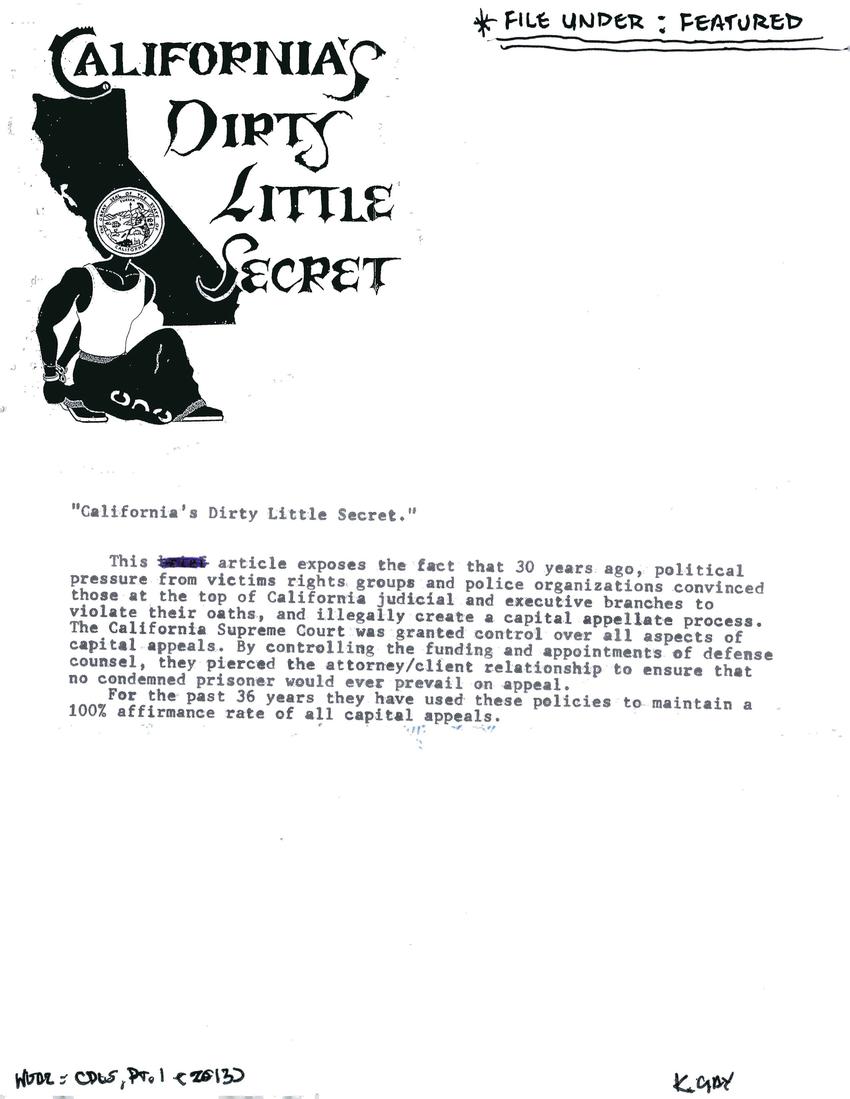
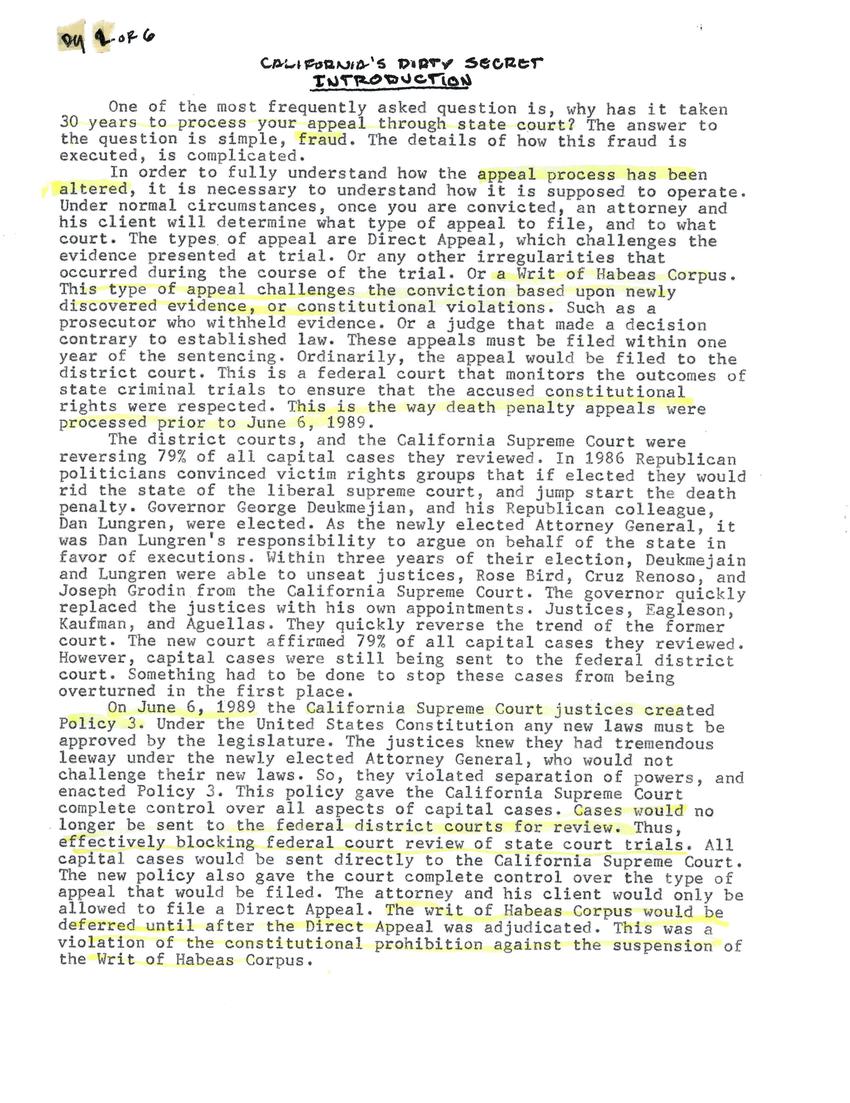
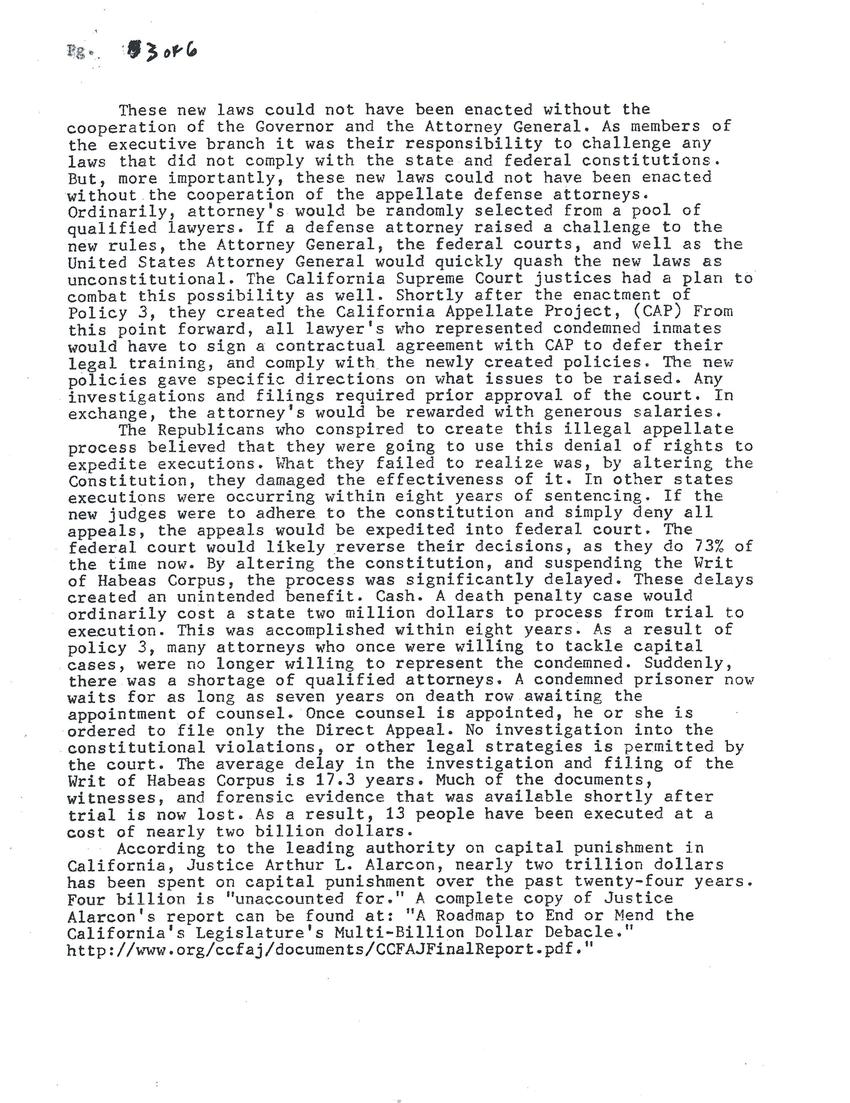
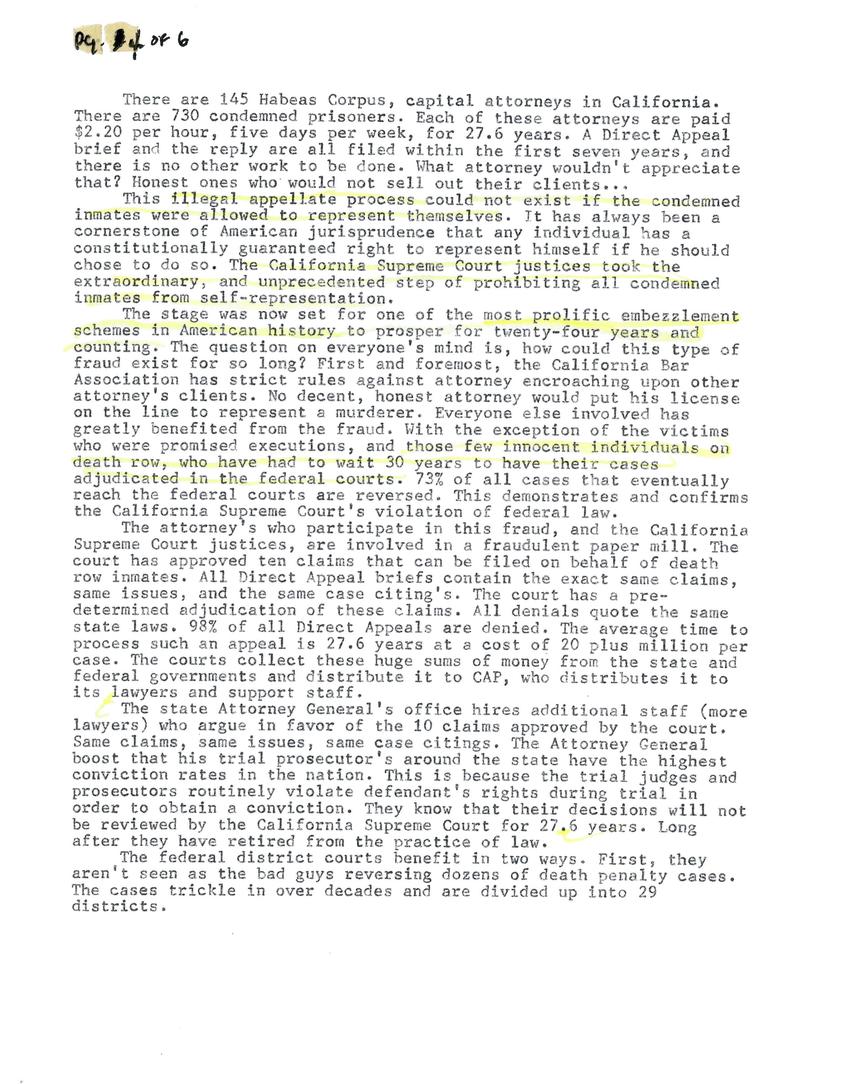
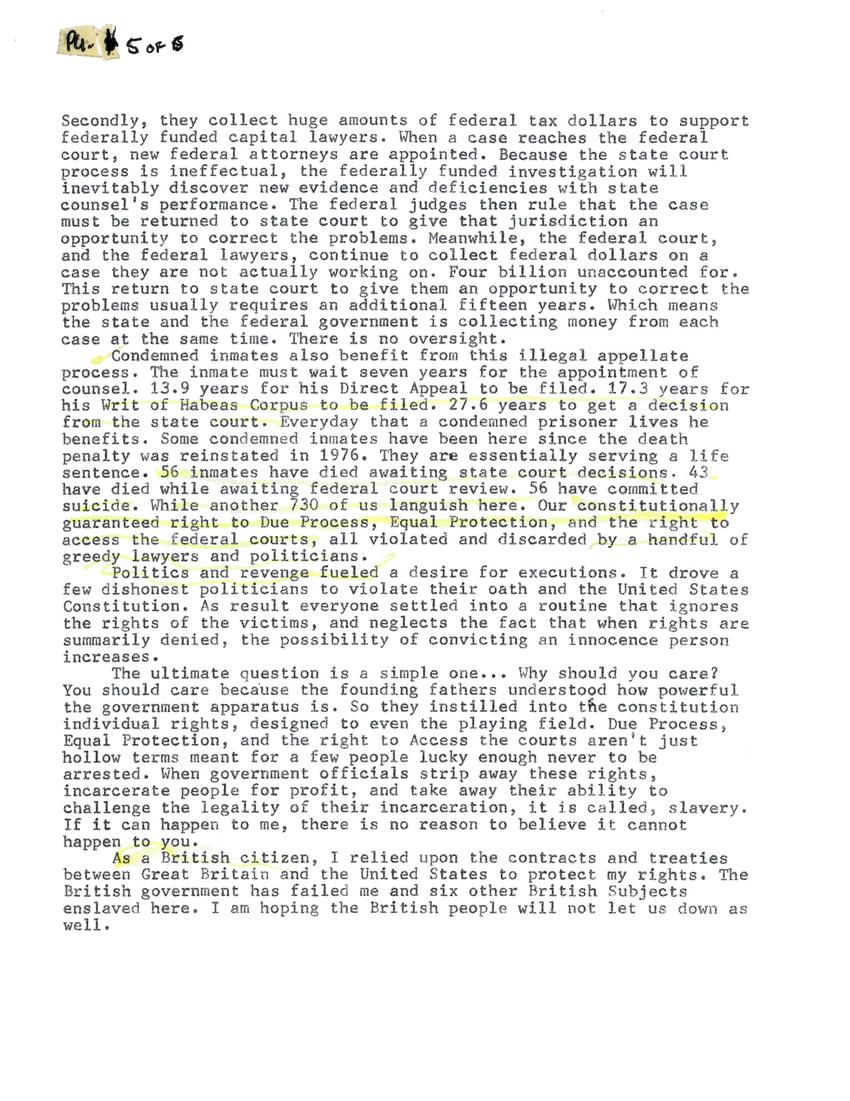
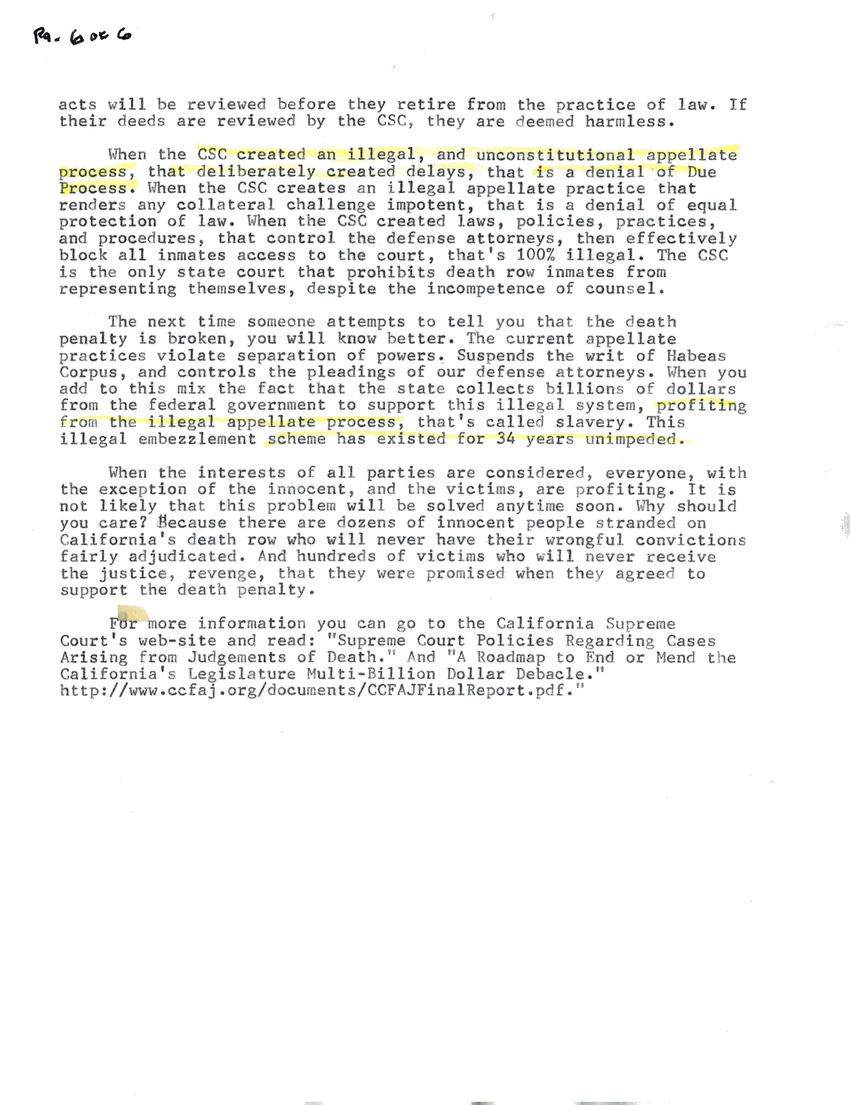

Replies